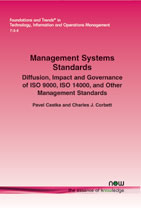Management Systems Standards: Diffusion, Impact and Governance of ISO 9000, ISO 14000, and Other Management Standards
By Pavel Castka, University of Canterbury, New Zealand, pavel.castka@canterbury.ac.nz | Charles J. Corbett, UCLA Anderson School of Management, University of California, Los Angeles, USA, charles.corbett@anderson.ucla.edu
Abstract
Management systems standards have become ubiquitous, adopted by millions of organizations around the world. The ISO 9000 and ISO 14000 quality and environmental management systems standards are the most well-known, but standards exist or are emerging for many other aspects of management too. Such a widespread phenomenon invites many questions. Key among those are why organizations adopt these standards, what effect they have on organizations, and how the standards themselves are managed. Although the literature investigating these standards is vast, it is scattered across many disciplines, and largely disjointed. This monograph provides a comprehensive overview of the empirical research on ISO 9000, ISO 14000, and other management standards, revolving around the three key questions above.
Management Systems Standards:
The literature on the ISO standards is multidisciplinary and scattered around a broad collection of journals, making it near-impossible to get an overview of what we do and do not know about Management Systems Standards. This monograph fills that gap by providing an integrated perspective on the entire body of academic literature related to ISO 9000, ISO 14000, and related standards. The aim is to provide an overview of the academic empirical literature on ISO 9000, ISO 14000 and related management systems standards to improve the quality, relevance, and coherence of that literature. The authors provide an overview of the design, governance, and evolution of the ISO 9000 and 14000 standards. They then offer a very short chronological overview of the evolution of research into ISO management standards. The monograph contains a section "about this monograph," which provides details about the methodology we followed, and refers to the intended audience and novelty of the work.
